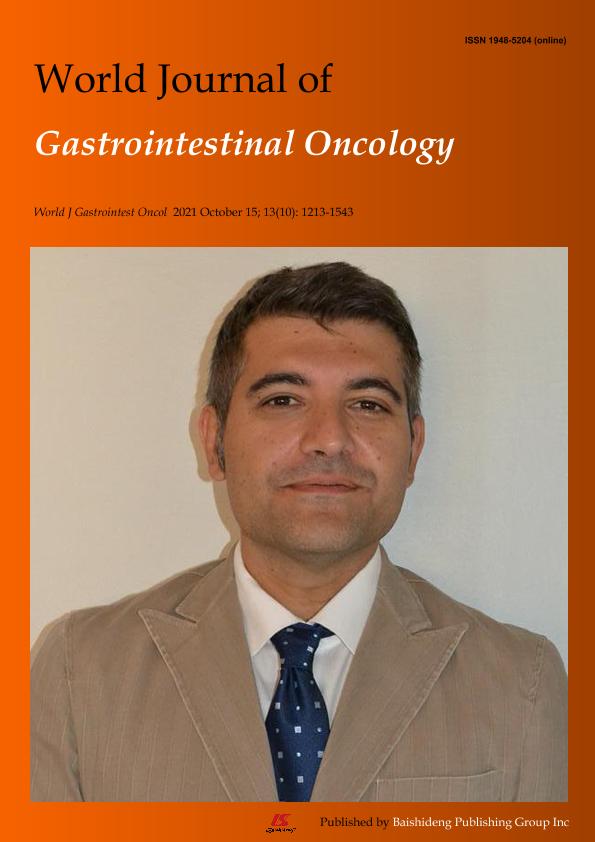Artículo
Survival effect of probiotics in a rat model of colorectal cancer treated with capecitabine
Gigola, Graciela; Carriere, Pedro Matias ; Novoa Díaz, María Belén
; Novoa Díaz, María Belén ; Perdigon, Gabriela del Valle
; Perdigon, Gabriela del Valle ; Zwenger, Ariel Osvaldo; Gentili, Claudia Rosana
; Zwenger, Ariel Osvaldo; Gentili, Claudia Rosana
 ; Novoa Díaz, María Belén
; Novoa Díaz, María Belén ; Perdigon, Gabriela del Valle
; Perdigon, Gabriela del Valle ; Zwenger, Ariel Osvaldo; Gentili, Claudia Rosana
; Zwenger, Ariel Osvaldo; Gentili, Claudia Rosana
Fecha de publicación:
15/10/2021
Editorial:
W J G Press
Revista:
World Journal of Gastrointestinal Oncology
ISSN:
1007-9327
e-ISSN:
1948-5204
Idioma:
Inglés
Tipo de recurso:
Artículo publicado
Clasificación temática:
Resumen
BACKGROUND: Probiotics are used to manage a number of gastrointestinal disorders due to their beneficial properties. Clinical reports showed that probiotics also improve the life quality of patients with colorectal cancer (CRC) subjected to oncologic treatment. In a CRC animal model, probiotics supplementation has the potential to decrease the formation of aberrant crypts and ameliorate tumor malignancy, enhancing the antitumor effect of 5-fluorouracil (5-FU) chemotherapy. Based on these data, we hypothesize that the administration of probiotics impact positively in the overall survival and life quality of rats with CRC under the treatment of capecitabine, which is the pro drug of 5-FU. AIM To evaluate the probiotics effects in a rat CRC model treated with capecitabine and followed until the end of life.
METHODS: 1,2-Dimethylhidrazine dihydrochloride (1,2-DMH) was employed as carcinogen inductor of CRC. Fifty male Wistar-Lewis rats were randomly assigned to one of five following groups: Control (n = 5), Control + probiotics (Control-P group, n = 5), 1,2-DMH alone (DMH group, n = 10), 1,2-DMH + capecitabine (DMH-C group, n = 10), 1,2-DMH + probiotics (DMH-P group, n = 10) and 1,2-DMH + capecitabine + probiotics (DMH-C-P group, n = 10). All parametric data were expressed as the mean ± SD. The statistical significance of differences was analyzed using one-way ANOVA. Data were analyzed with InfoStat software. The results were considered statistically significant at P < 0.05. Overall survival was evaluated with the Kaplan-Meier estimator with the log-rank test.
RESULTS: The data of mean overall survival for DMH, DMH-P, DMH-C, DMH-C-P, Control and Control-P groups were 250 d [95% confidence interval (CI): 242.5-253.1], 268 d (95%CI: 246.3-271.4), 380 d (95%CI: 337.8-421.9), 480 d (95%CI: 436.9-530.7), 588 d (95%CI: 565.8-609.3) and 590 d (95%CI: 564.3-612.9), respectively, with a significant difference between DMH-C and DMH-C-P groups (P = 0.001). Comparing all groups by Kaplan-Meier estimator, we found a significantly different in the overall survival of DMH and DMH-P groups respect to DMH-C (P = 0.001) and DMH-C-P (P = 0.001) groups; interestingly, there were no meaningful differences between Control, Control-P and DMH-C-P groups (P = 0.012). The tendency of change in body weight gain of the rats at 90 d of finishing DMH administration was similar in Control group compared with DMH-C and DMH-C-P groups; however, and of relevance, DMH-C-P group has experienced a higher body weight gain at the end of animal's life than DMH-C group (P = 0.001). In DMH-C-P group we found a positive effect of probiotics in clinical manifestations since diarrhea, constipation and blood stool were absenting. Also, the tumor burden was lower in DMH-C-P than DMH-C, DMH-P or DMH groups (1.25 vs 1.81 vs 3.9 vs 4.8 cm2, respectively). DMH-C and DMH-C-P groups showed only mucinous carcinoma type while in other DMH groups the tumor types were variable. However, mucinous carcinoma from DMH-C-P group showed invasion until muscularis propria layer. Interestingly, metastatic lymph node was observed in DMH, DMH-C and DMH-P groups but not in DMH-C-P. All animals in Control group died from natural causes without objective injuries. All animals of DMH and DMH-P groups died from tumor complications (i.e., obstruction or intestinal perforation); however, this cause was seen only in 44.5% of DMH-C and DMH-C-P groups.
CONCLUSION: Probiotics administration improves life quality of rats with CRC under capecitabine treatment and also has a positive effect in the overall survival of these animals treated with this drug.
Archivos asociados
Licencia
Identificadores
Colecciones
Articulos(INBIOSUR)
Articulos de INSTITUTO DE CIENCIAS BIOLOGICAS Y BIOMEDICAS DEL SUR
Articulos de INSTITUTO DE CIENCIAS BIOLOGICAS Y BIOMEDICAS DEL SUR
Citación
Gigola, Graciela; Carriere, Pedro Matias; Novoa Díaz, María Belén; Perdigon, Gabriela del Valle; Zwenger, Ariel Osvaldo; et al.; Survival effect of probiotics in a rat model of colorectal cancer treated with capecitabine; W J G Press; World Journal of Gastrointestinal Oncology; 13; 10; 15-10-2021; 1518-1531
Compartir
Altmétricas



